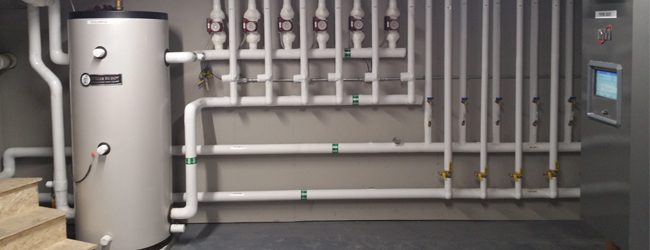Geothermal Heating & Cooling

Whether you prefer the “green” of the environmental impact or keeping your hard earned “greenbacks” in your pocket, geothermal is the kind of green that we can all agree on!
TOP BENEFITS OF GEOTHERMAL ENERGY
Low Operating Cost:
Most systems will operate on approximately 70% of what a conventional system would cost. Lower energy costs preserve income for other expenses. Energy costs today represent about 25% of the annual household budget and that number is expected to be 40% by the year 2020. Not only will you reduce your energy costs but you can also accurately predict them from year to year. No more worrying what fuel prices will be next year!
Quiet Operation:
No more turning up the television when the furnace starts! Oil burners are are effective at burning oil but they are very noisy about it. Conventional outdoor air conditioning condensers are noisy and can ruin a peaceful afternoon outdoors. A geothermal heat pump has a small condenser located inside the heat pump that runs quietly and efficiently without causing any noise disruption to you and your family.
Carbon Footprint:
If being green is your motivation, geothermal is your answer! Electricity can be generated by a private solar collection system or green power can be purchased through exchanges making the system 100% green. With no combustion, geothermal systems emit no carbon monoxide or carbon dioxide. Breathe easy knowing your geothermal heating & cooling system is carbon neutral.
Clean and Safe:
There is no combustion in a geothermal heat pump and there is no fuel stored on site; therefore, there is no danger of spills or carbon monoxide poisoning.
Positive Cash Flow:
A geothermal heating and cooling system is an investment. Think of it as drilling your own personal oil or natural gas well in your back yard. That energy is now yours forever. A household that is pre-buying oil each heating season is essentially already paying for geothermal. Twelve months of loan payments with
interest and the electricity to run the geothermal heat pump may be the same (or maybe even less) than the annual expense of oil. It makes economic sense.
Answers To Common Questions About Geothermal
Does ground temperature equal house temperature?
We get this question a lot. That is a lot of misinformation on this topic out there.
The quick answer is no.
In detail, geothermal uses the temperature in the earth or with the energy in the earth to affect a refrigerant. The process changes the state of a refrigerant from a liquid to a gas. We run that through a compressor and squish it back down. When anything is compressed, it gives off its energy. So we use that energy to create either 120 degree water or 105, 108-degree air.
With geothermal, we’re taking a fluid loop consisting of water and denatured alcohol, and we send it down the geothermal bore hole in the earth, and it will pick up energy. It will increase in temperature while it’s traveling through the bore hole in the earth.
Let’s say that fluid is at 47 degrees when it comes out of the earth. It goes through the compressor in the heat pump and then we rob the temperature off it. We send that same fluid back down the hole again and it may be 42 degrees, 40 degrees, 39 degrees. So we’re robbing a few degrees off of it in order to keep that refrigerant cycle going, boosting those temperatures.
Can’t I just hook my baseboard system up to my geothermal system?
With geothermal, the hottest water we can generate is about 120 degrees; 118, 120 on a good day. Baseboard radiators are a high-temperature type of radiation. They really require 150-degree water to even begin emitting BTUs. They’re really happiest at 180 or 190 degrees. If we were to send 120-degree water to your baseboard heater it’s not even going to recognize it. It’s just not going to put out any heat.
The best way to install geothermal in an existing home with a baseboard system would be with a redundant ducted system leaving your baseboard system in place as supplemental.